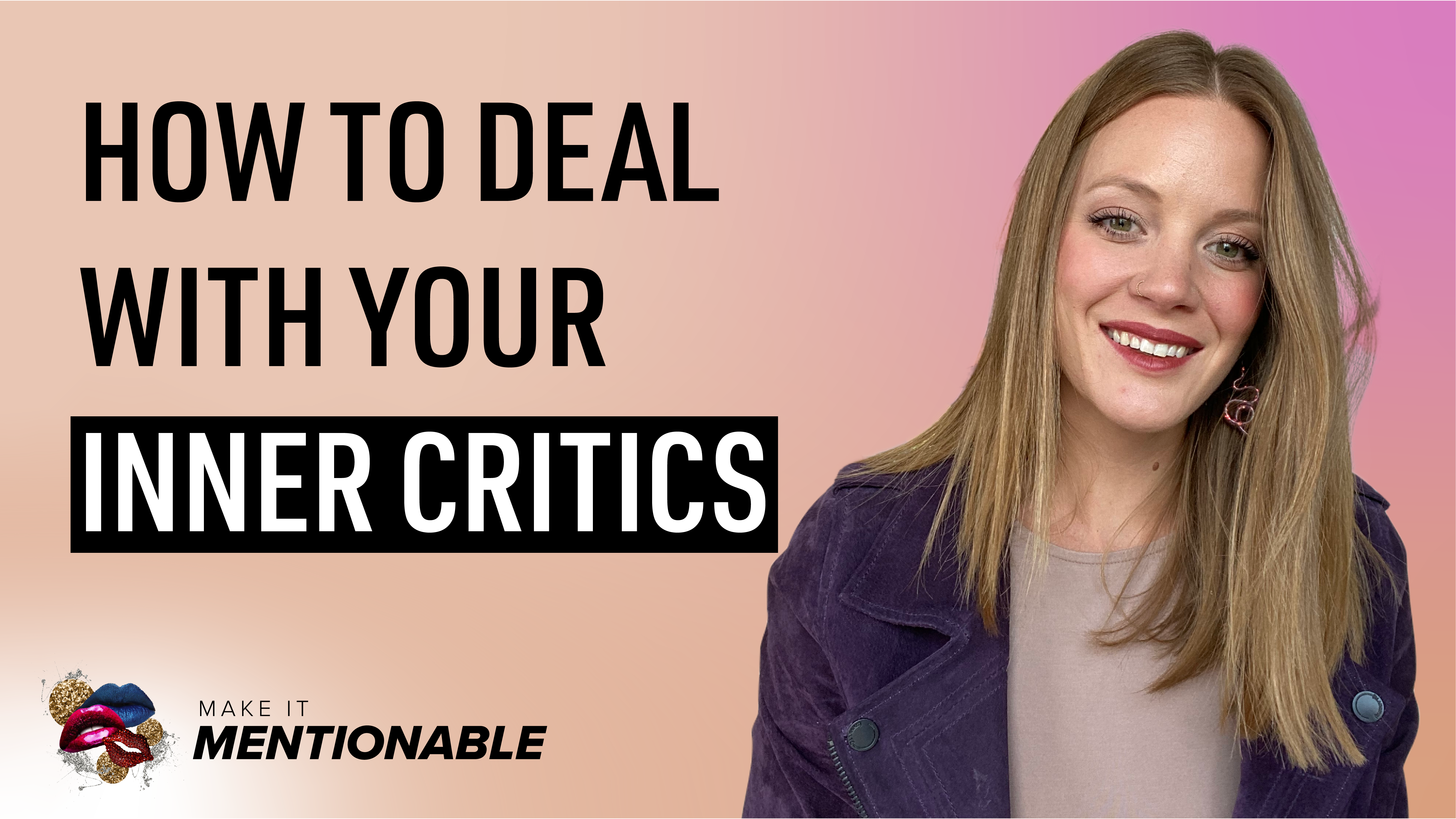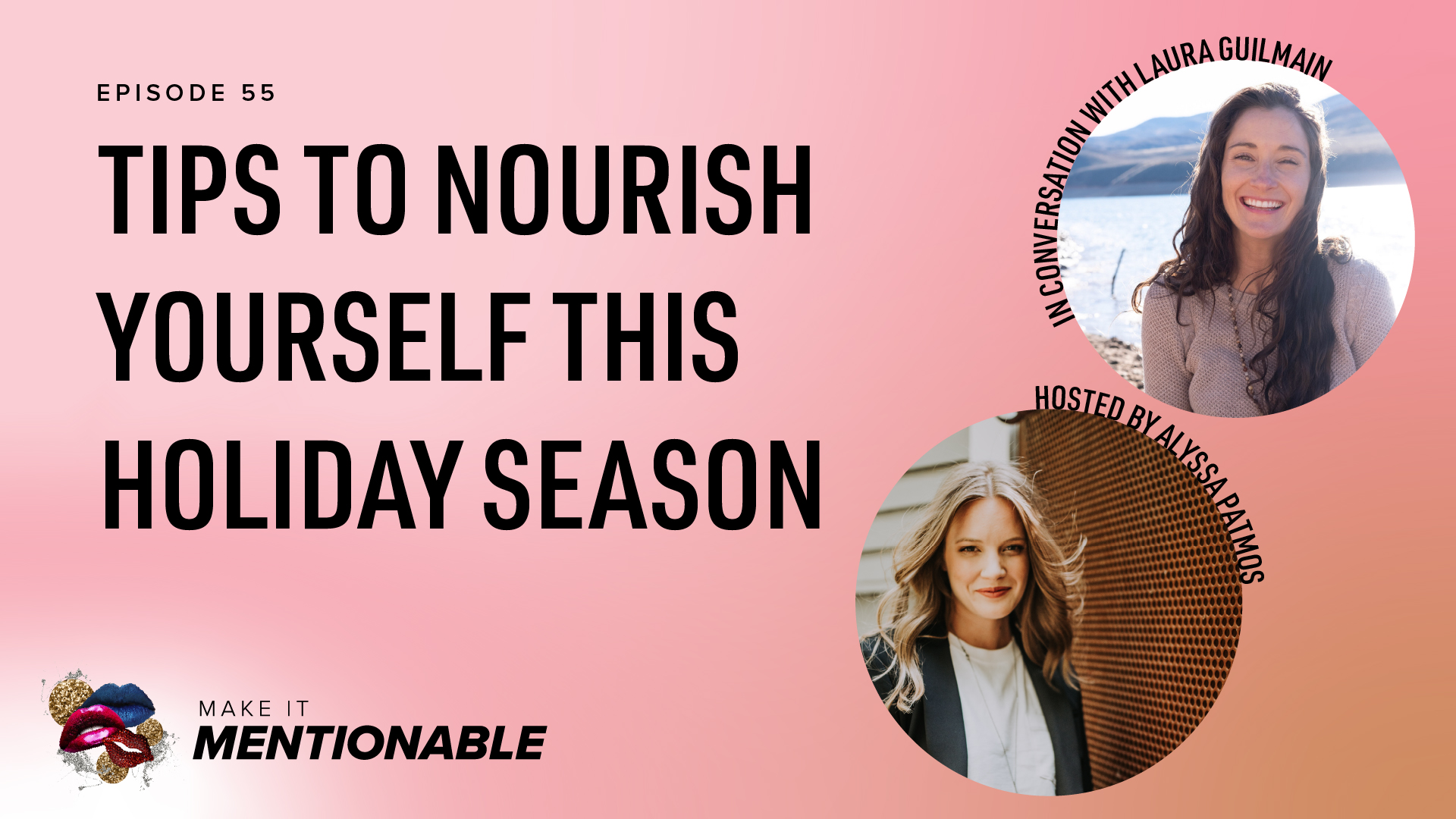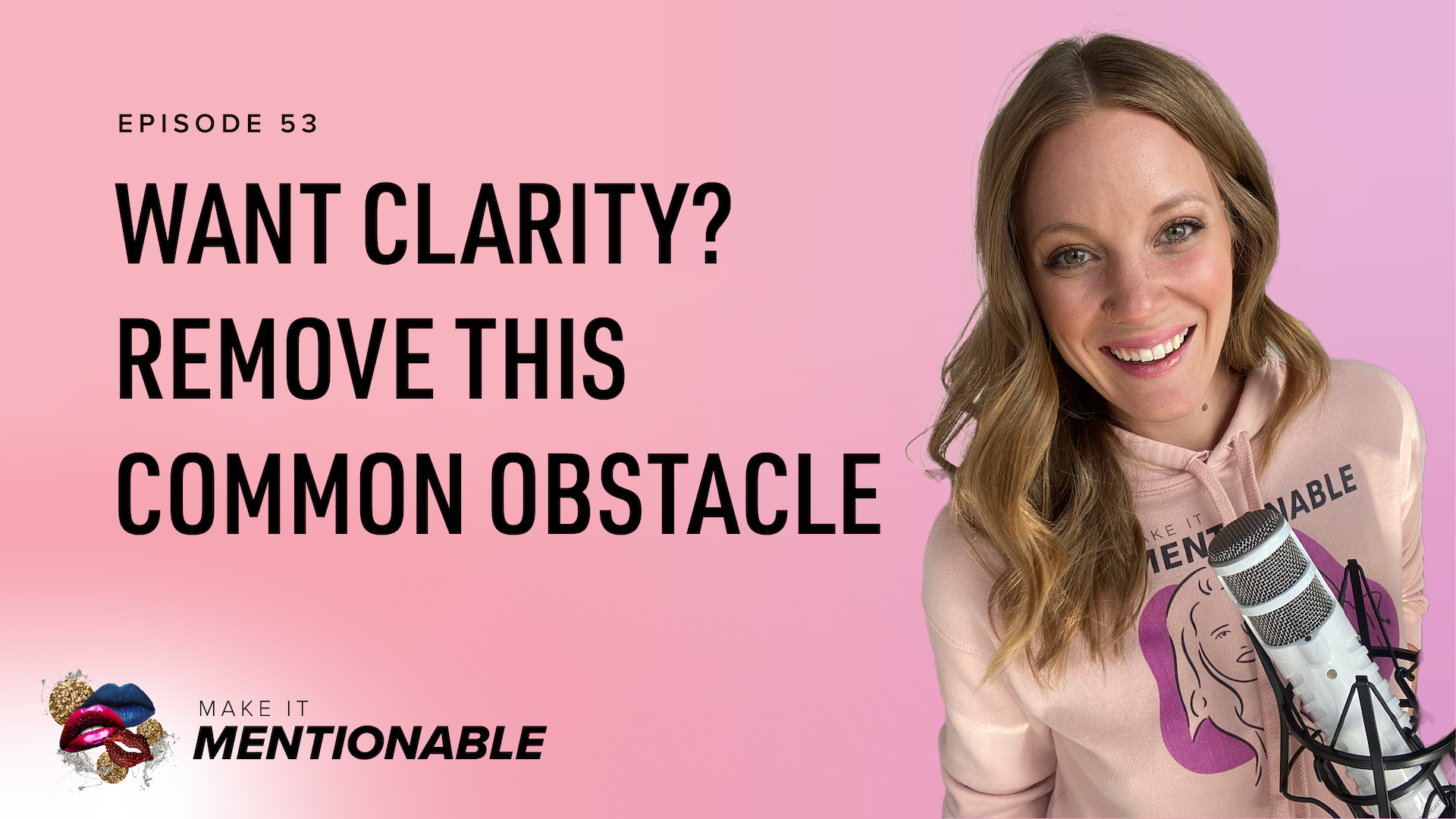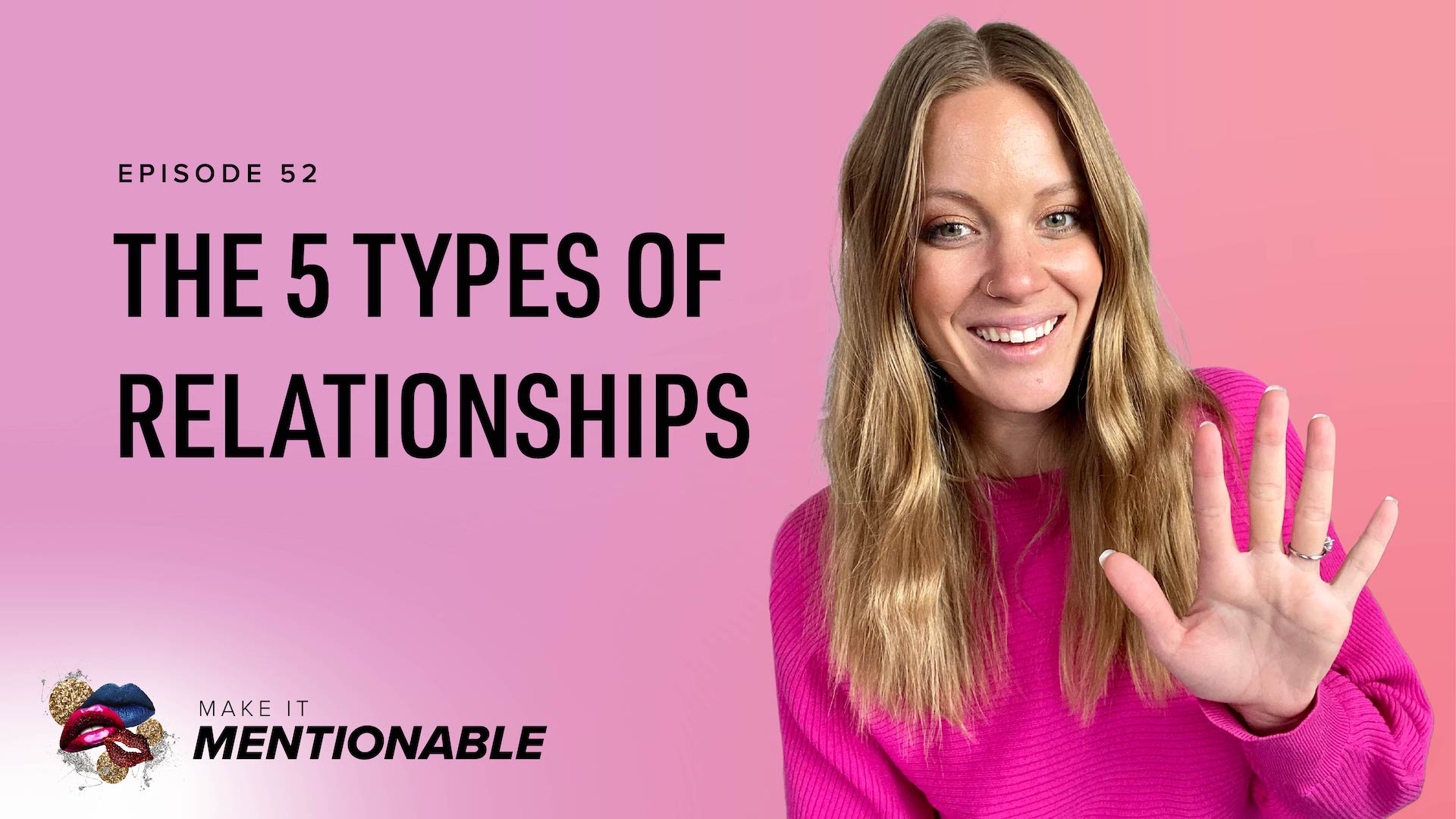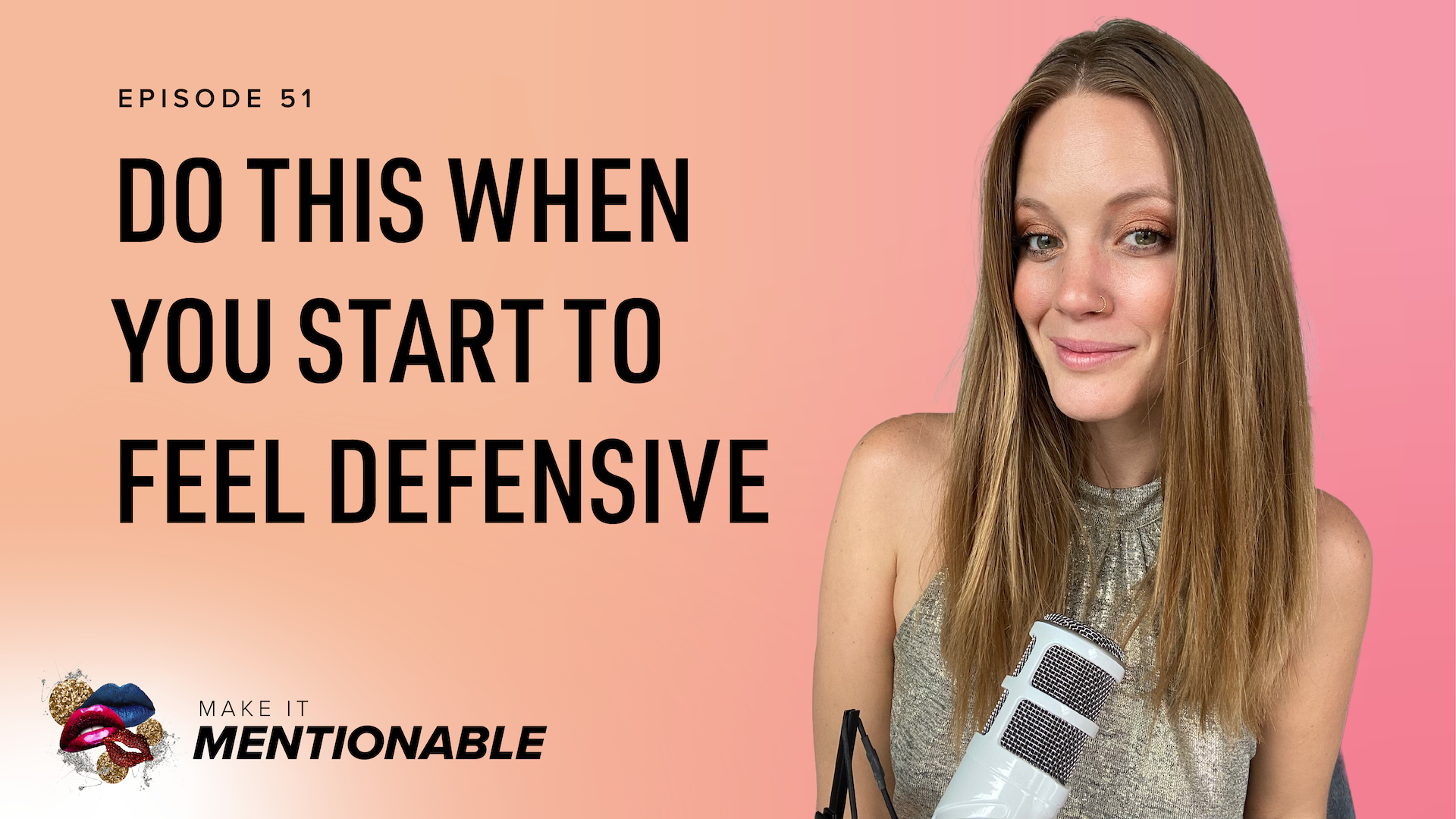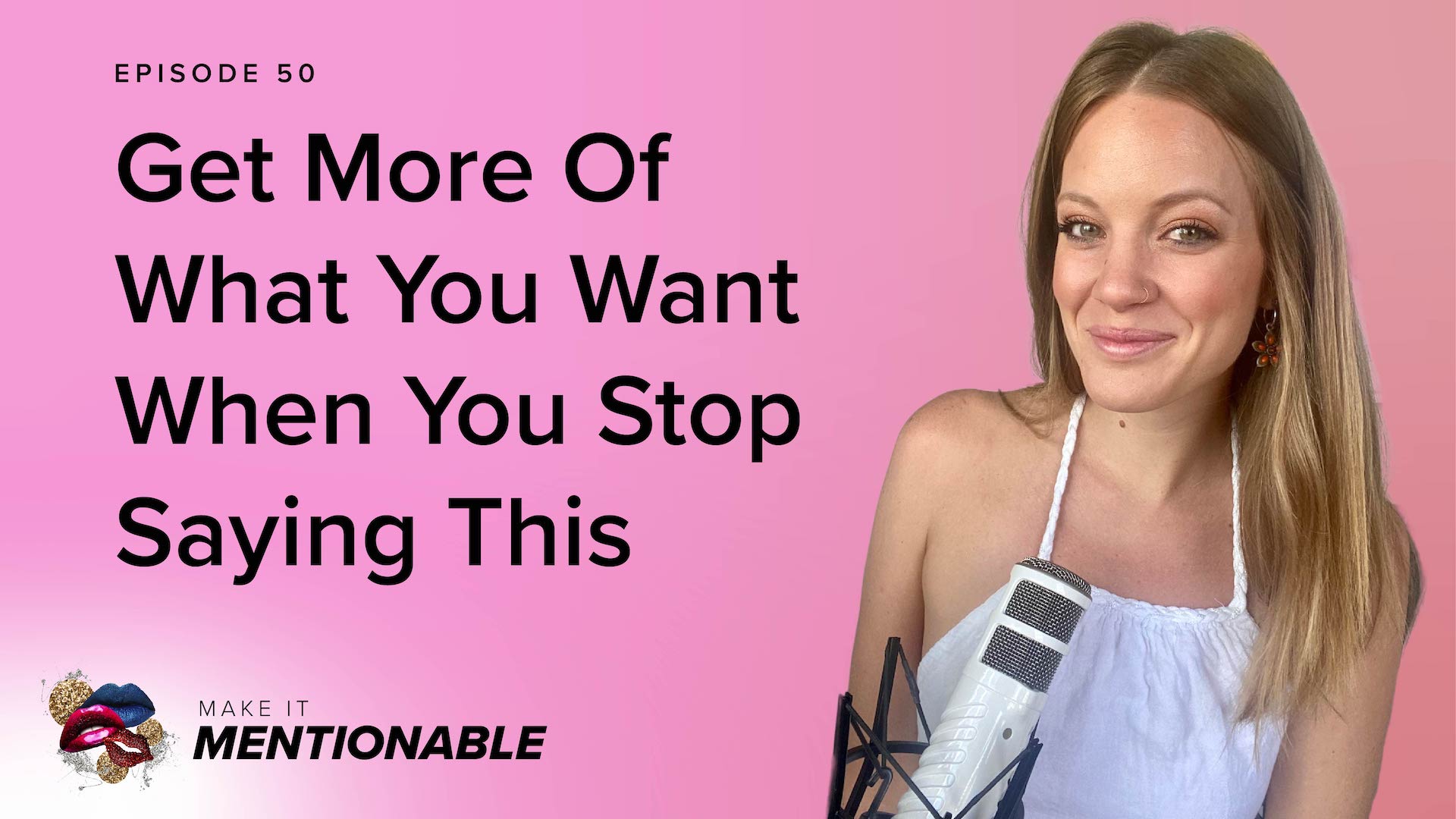Alyssa Patmos 0:04
This is Make It Mentionable. I’m Alyssa Patmos and this is the show about being human in a world that encourages us to be robots. I invite you to join me as we journey through the mess, the magic and the mania in between. Because what we can talk about, we can manage. This honest conversation extravaganza includes free flowing conversations and high doses of vulnerability to remind you that you aren’t alone. No topic is off limits, and episodes are designed to leave you smarter, aka more self aware than when you came. I am so glad you’re here.
Hello, Hello. And welcome back to another episode of Make It Mentionable. I’m your host, Alyssa Patmos. And this week, we are talking about inner critics. And I want to give you this is a little bit of a different format. And I’m just gonna give you one thing to help calm the inner critic so that you can move forward without the shame and the pressure and the guilt that they can sometimes bring up. So if you have a little voice that sits on your shoulder and tells you you’re bad at times, or tells you you’re not good enough, or if you overanalyze conversations, there is sure to be a gem in here for you. So I’m constantly talking about how the stories we tell ourselves, and the stories we tell others shape our reality. And I saw this quote from Byron Katie, earlier this week, and I thought it summed it up it very well it says the world is nothing but my perception of it. I see only through myself, I hear only through the filter of my story. And so our stories, the stories that we tell ourselves become really important in that way. And one of the biggest things that influences the stories that we tell ourselves are our inner critics. And these inner critics have a sneaky way of subconsciously controlling our lives because they’re influencing the stories that we tell ourselves, which is influencing our perception of the world. It’s influencing our perception of interactions of conflict of, of another person’s behavior. And so it becomes really important to be able to work with these inner critics instead of just letting them run the show. So, for make it mentionable, in the intro, I talked about how each episode is designed to leave you smarter, aka, more self aware than when you came. And being able to recognize what inner critic is coming out and when it’s coming out is a self awareness superpower. And so by the end of this episode, you’ll be able to walk away with knowing a little bit more about your inner critics and hopefully being able to recognize them even better. So the first thing I want to start with is, this is going to be a little bit of a shorter episode. So you know how you can go to a restaurant and order an entree where you get the main dish, and you might get like two sides with it. This is more ala carte, you know, when you go in, and you just want to grab a taco or homicide or rice or something. So this is an ala carte episode. And we’re going to try out the format. So inner critics, inner critics, they are pieces of ourselves. And they influence how we recognize and understand the world. And so what are some examples of an inner critic, one that might be really easy to identify is a perfectionist, maybe you are about to turn in a project, and you’re a little bit worried about it. And it’s a big deal. It’s a big deal for your team. And so you instantly hear this voice of like, that’s not good enough, you should have spent more time over preparing. And you hear that voice in your head, and it tries to make it so that everything is perfect, so that you can’t get hurt. Or maybe maybe an amazing opportunity presents itself.
Maybe you have the chance to move to the city you’ve always wanted to live in or you you have a chance for a promotion. And you really really really want it but you instantly hear a voice that says you can’t pass possibly get that job? Who do you think you are to be able to live there, and it undermines you and undermines your confidence and undermines your ability to take bigger risks. Or maybe you just want to wear a different shirt than you normally wear to work. Or maybe you want to wear a shorter skirt than you normally wear. When you go out on a date, and you put it on, and then you instantly hear a voice that says, You can’t dress like that, that’s not professional, or you don’t get enough you can’t or that it’s a date. Or maybe you hear you drink a bit too much. Maybe you go out, you’re having an Espresso Martini turns into two. And maybe you just hear a voice when you get home that shames you. And it’s like, he was just over indulge, what were you thinking? What were you thinking and maybe it draws attention to a certain area of your body. But it’s it’s it’s critiquing you for for over indulging there. Or maybe you miss something on your to do list and instantly hear a voice telling you that you’re negative, or telling you that like you’re lazy. You’re unproductive like, God, why would anyone wants to pay you? Why are they hiring you? Why? Why do you have this job like you’re so so lazy, you have to get more done. Or maybe someone critiques you for not cleaning the bathroom, or or you know, your partner mentioned something about not picking up the dishes, maybe you even already knew that you were a little bit behind. And then you instantly have this voice that’s like, You’re worthless, like, and you feel guilty. And so in all these situations, that little voice that creeps in ends up dictating our next behavior, if we don’t take time to separate from it, and to recognize it for what it is, which is a critic, and these critics are pieces of us that are developed and they’re often formed for protection. You know, maybe there was a time where you really did need to turn in something excellent. And maybe you were critiqued for it not being up to par. And then you develop to thinking that like everything that you turn in has to be perfect. Many times these critics develop, I would even go us to say all the time these critics develop to protect us from something and so they have a purpose. And so, you know, let’s take the dishes or the bathroom as an example. If if all of a sudden your partner comes around the corner, and they’re like, Hey, are you ever gonna do these dishes? Are you ever gonna claim this bathroom? If you have that guilty voice that comes up the guilt trip or where it’s like, God, I’m so bad, like, so awful, I’m worthless, if that comes up right away, which again, those are like extreme statements, but some version of that, it’s very likely that that can come up. And so if you have that, if that’s one of your inner critics, then it instantly causes an emotional reaction of, of feeling guilty or feeling panicked or feeling like something might be at risk. And so from there, we might get defensive. We might, instead of saying, You know what, you’re right, I have been slacking, I’ll get to it does, is it okay? Or would you have a problem? If it’s done tomorrow?
Instead of reacting in that way, it becomes, oh, my god, like, why are you asking me to do this? Why don’t you help and do it or some outsized reaction, and this is how this so it’s really easy to get into conflict in any sort of relationship, whether it’s romantic or not, because we have these inner critics come out, that is then leading to a feeling and then it becomes really hard to articulate what’s going on. And so we just end up in reactionary land. And we’ve talked about reactionary land before. It’s not merely it’s not, it’s not a good place to live, because we’re just reacting to, to what is positioned in front of us instead of taking a step back to respond. And when we think about that, quote, from the beginning, the world is nothing but my perception of it. I see only through myself, I hear only through the filter of my story, for not taking a second to separate from these inner critics and we’re just reacting to what they’re saying. Then we’re setting up a story of of their, what they’re saying to us as the truth and it’s not It’s not. And so and so what we have to be able to do is cultivate this ability to recognize when an inner critic is coming out. And my absolute favorite way to do this is to give them names. So for example, I have a perfectionist part. And we’ve talked about perfectionism on the show before because it’s something that permeates for so many people, it is an inner critic that influences so many people we feel like we have to be perfect or love is going to be taken away or, or something that we want is going to be threatened or put at risk. And so for me, I named my perfectionist Polly, Polly, the perfectionist. And now when I get those feelings when I hear that voice that’s like, this has to be perfect. Or you have to be in the perfect mood, or why are you being sad right now that you need to be happy, like you need to be in the perfect mood. Whenever those voices come up, I recognize that as Polly. And from that place, I can say wait, is this actually is this the information that I want to be reacting from, and I can take a step back, and then I can respond and I can choose from my actual self, what what I want to do going forward. And so it’s a huge self awareness superpower to be able to name and recognize these parts of ourselves, these critics that come out, and we employ different different parts of ourselves for different reasons. So critics are one, they’re trying to keep us in line, and they want to protect us. But other times, you know, we might have have other parts that are trying to protect us from from fears. And so maybe there’s a part of us that has a tendency to get louder, if we don’t feel heard, in which case, you know, maybe that’s a part with a megaphone, and you see it as a part with a megaphone. Or maybe you get scared in conflict, and, and you puff up. And so you might have a puffer fish part. So being able to recognize, and, and identify and recognize these parts is massively important for being able to shape your perception in a different way. So what do you do? The first thing, the first thing and the simplest thing to do to start changing your relationship with the inner critic is to give it a name, and to recognize it. So you can ask yourself, if you hear that voice come up, you can ask yourself, Who does this look feel or sound like? And you can either do that with your eyes open or closed, but see what comes up. See if it looks like someone you know, see if it it puts on a character for me, the perfectionist, you know, it’s Polly the perfectionist, and she is like, kind of like Elle Woods in Legally Blonde, you know, very proper, and everything is perfectly tailored. And she enunciates incredibly well. And, and has no problem wanting to bossed me around when she doesn’t feel like things are meeting her standard.
So so then I can have a conversation with her because so I can’t have a conversation with her though if I don’t give her a name if I don’t recognize her if I don’t realize that that is something separate from from me. When I recognize that now, if I get into that mode where I’m trying to finish a project, it can it’s the difference between Okay, is this does this represent excellence? Is this good enough? Is this is this something I’m proud of? And her wanting everything to be perfect? Because then that way we can’t be judged? We can’t be hurt, etc, etc. And I can have a conversation with her and be like, Okay, what what do you need right now to feel safe, because that’s the other thing, these critics, they’re trying to protect us they don’t feel safe. And so when we can have when we can name them and recognize when they’re coming out we can then have a conversation with them and give them a voice. I see so many advice columns or or self help books that talk about like banishing these things and putting it aside and kicking it to the curb. And yes, I want perfectionist tendencies to go away, which is why I was talking about being a recovering perfectionist. But banishing it is not a way for it to tone down. Its desire for control that actually increases it. And so being able to cultivate a relationship with that inner critic and having a conversation with it and allowing it to be heard, and then moving forward in a different way. allowing you to be heard is going to allow you to move forward in a different in a different way. So how can you name some of these critics? So for me, I have perfectionist Polly, I talked a little bit about how you know, you might have the one where you miss something on your to do list or the one that is just like obsessed with you needing to be productive all the time, or else, you’re the laziest person on the planet. So for me, that part is Alison, parts manager. And she’s constantly trying to keep all of the plates spinning, and she wears a headset, and she’s running around with their hair on fire constantly trying to keep everything together. Like everything is always fine. In Allison’s world, she’s trying to make sure everything is fine. And so if that part of me comes up, then you know, I have to have a conversation with her. The the gilt tripper, maybe her name’s Gilda, if you feel guilty all the time. It’s different for everyone. But a lot of us actually have the same inner critics, it’s just how they play out is different for everyone. And so there’s no one size fits all solution, and cultivating a relationship with your individual inner critic, so you understand what it needs when it comes out. And what it wants, allows you to respond in a different way rather than simply reacting. And that is a self awareness superpower that can save you tons of time and actually allow you to pivot into more of what you want to do in situations and in conversations, when we can recognize these parts coming up in conflict. So for example, like if you recognize that you feel guilty Gilda, the guilt trippers coming up, when your partner is asking you about cleaning the bathroom, you can even say like, Hey, I’m feeling I’m feeling guilty about that, like, you’re right, I’ve been slacking, let me, let me get to it. Or if you need to have a deeper conversation around what the roles and responsibilities are, you can, but you’re not just immediately immediately reacting from that place of I’m a terrible person that Gildas trying to make you feel like So Tip of the day, ala carte style, is to start thinking about how you can recognize your inner critics and give them a name. Given the name, give them a name, and I would love to know how this goes if you recognize one that has been permeating your life. Come over to the comments at Alyssa patmos.com forward slash show. You’ll see this episode there. And come join me in the comments and tell me what you have named one of your parts. I would love love love to know.
You’ve just finished listening to another episode of Make It Mentionable with me, your host, Alyssa Patmos. If you’re looking for more in between episodes, then sign up for The Peel. It’s my free newsletter that gives tips for how to navigate whatever life dishes and it’s also the place where I share the juiciest of stories. To check it out, head on over to AlyssaPatmos.com/ThePeel. Thank you so much for tuning in, and I’ll see you next time.
Transcribed by https://otter.ai

